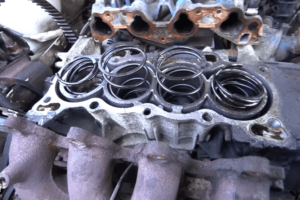Carvana, the online used car retailer, has been the subject of bankruptcy concerns in recent years. The company’s stock prices have plummeted by about 97% this year after reaching an all-time intraday high of $376.83 per share on August 10, 2021.
The company’s market cap is now $723 million, down from $60 billion at its peak. The drop in share prices has led to speculation that the company may be forced to liquidate its inventory.
Carvana has completed its debt restructuring with a majority of creditors agreeing to participate in the deal, slashing about $1.3 billion of debt and saving the company more than $455 million in interest payments.
However, despite this, the company is still facing financial difficulties, with experts predicting that it may be close to bankruptcy. If Carvana were to go bankrupt, its inventory would be liquidated, and there are concerns about how this would impact the market.
Allowing liquidation to dilute the market doesn’t seem like good business, being that Carvana isn’t some small street corner dealership. And also that a liquidation should pay down on debt, so there would be questions of why inventory was sold off cheaper than it could have been.
Used car dealers could potentially benefit from Carvana’s liquidation, but buyers should feel relatively protected, according to experts. As of now, Carvana’s future remains uncertain, and the possibility of liquidation continues to loom over the company.
Carvana’s Business Model

Carvana is an online used car retailer that has gained popularity in recent years. The company’s unique business model is centered around its car vending machines, which allow customers to pick up their purchased vehicles from a giant glass tower.
Carvana’s business model is designed to eliminate the need for sales lots and salespeople, which the company claims reduces overhead costs and allows for lower prices.
The company’s website is its primary sales channel, and customers can browse through a large inventory of cars, complete the purchase process, and arrange for delivery or pickup at a vending machine location.
The company’s business model has been successful in disrupting the traditional used car market, and Carvana has experienced rapid growth since its launch in 2012.
However, critics have raised concerns about the sustainability of the company’s business model, and some have questioned whether the company will be able to maintain its growth trajectory.
Carvana’s focus on technology and innovation has helped it to stand out in a crowded market, and the company has invested heavily in developing its proprietary technology platform.
This platform allows Carvana to efficiently manage its inventory, pricing, and logistics operations, and has helped the company to streamline its business processes.
Overall, Carvana’s business model has been successful in disrupting the traditional used car market, and the company has experienced rapid growth in recent years.
However, the company faces challenges in maintaining its growth trajectory, and critics have raised concerns about the sustainability of its business model.
Financial Challenges
Carvana, a used car retailer, has been facing financial challenges in recent times. One of the significant issues that the company is currently facing is the burden of debt.
According to CNBC, Carvana’s largest creditors have reportedly signed a deal that binds them to act together in case of bankruptcy. This has raised concerns that the company may be heading towards bankruptcy.
The debt restructuring covers more than 90 percent of Carvana’s $5.7 billion in unsecured notes. Holders of about $5.2 billion of the notes agreed to swap their holdings for new debt and equity in a new company that will own Carvana’s assets.
The restructuring plan was agreed upon by the company and its creditors, including Apollo Global Management, which is one of Carvana’s largest shareholders. The deal aims to reduce Carvana’s debt burden and provide the company with the necessary liquidity to continue operations.
Despite the debt restructuring, the company’s shares have plummeted by more than 40% during trading, as per CNBC. The upstart used car dealer has seen 98% of its market value evaporate and its stock plunge to just $4.81 as of Friday morning, as reported by Business Insider.
Carvana’s financial struggle is also fueled by burning cash and approaching debt maturities, as per Seeking Alpha. The company’s management has acknowledged that they are facing a cash crunch, which has raised concerns about the company’s ability to continue operations.
In summary, Carvana is facing significant financial challenges, including debt, bankruptcy, and restructuring. The company has been struggling with a cash crunch and approaching debt maturities, which has led to concerns about its ability to continue operations.
However, the debt restructuring plan agreed upon by the company and its creditors aims to reduce Carvana’s debt burden and provide the necessary liquidity to continue operations.
Market Impact and Stock Performance

Carvana’s recent financial troubles have had a significant impact on its stock performance. According to CNBC, the company’s stock has plummeted by about 97% this year after reaching an all-time intraday high of $376.83 per share on Aug. 10, 2021.
The company’s market cap is now $723 million, down from $23.7 billion in August 2021. This represents a significant decline in value and has led to increased concerns about the company’s future.
The decline in Carvana’s stock price has been attributed to a number of factors, including concerns about the company’s ability to manage its debt and the impact of rising interest rates.
As Seeking Alpha notes, the company’s stock price is down over -96% year to date and down almost -98% since its peak in August 2021. With rates now closing in on 5% and a Federal reserve set to fight inflation, the company’s future is uncertain.
Wall Street analysts have also been revising their price targets for Carvana in light of the company’s financial troubles. According to Forbes, the impact of rising interest rates is starting to hit home, with sectors that rely heavily on debt beginning to feel the impact of lower demand.
Used car retailer Carvana looks close to bankruptcy, and its stock has plunged to just $4.81 as of Friday morning. This represents a significant decline in value and has led to increased concerns about the company’s future.
In conclusion, Carvana’s recent financial troubles have had a significant impact on its stock performance, with the company’s stock price plummeting over the past year.
The decline in value has been attributed to a number of factors, including concerns about the company’s ability to manage its debt and the impact of rising interest rates.
As a result, Wall Street analysts have been revising their price targets for the company, and many investors are concerned about the company’s future.
Influence of Economic Factors
Carvana has been facing financial difficulties due to various economic factors. One of the most significant factors has been the COVID-19 pandemic, which has caused disruptions in the supply chain of new vehicles and led to a surge in demand for used cars.
This has made Carvana’s online-only car buying experience desirable, as social distancing measures have made it difficult for people to visit physical dealerships.
However, the pandemic has also caused a recession, which has led to a decrease in consumer spending and an increase in unemployment rates. This has affected Carvana’s sales and revenue.
Another factor that has influenced Carvana’s financial situation is rising interest rates. The impact of rising interest rates is starting to hit home, with sectors that rely heavily on debt beginning to feel the impact of lower demand.
Used car retailer Carvana looks close to bankruptcy due to rising interest rates. The company’s largest creditors have reportedly signed a deal that binds them to act together in the event of a bankruptcy. This has caused concerns among investors, leading to a sharp decline in Carvana’s share prices.
Inflation has also played a role in Carvana’s financial struggles. Inflation has been rising due to supply chain disruptions caused by the pandemic and the increase in demand for goods and services. This has led to an increase in the cost of goods and services, including used cars.
As a result, Carvana has had to increase its prices, which has led to a decrease in sales.
Recessionary fears have also affected Carvana’s financial situation. The recession caused by the pandemic has led to a decrease in consumer spending, which has affected Carvana’s sales. In addition, the recession has led to an increase in unemployment rates, which has affected Carvana’s revenue.
Overall, Carvana’s financial difficulties have been influenced by various economic factors, including the COVID-19 pandemic, rising interest rates, inflation, and recessionary fears.
These factors have affected Carvana’s sales and revenue, leading to concerns among investors and a decline in Carvana’s share prices.
Industry Comparisons

When it comes to the used car market, Carvana is one of the most well-known names in the industry. However, there are several other key players in the market that are worth considering, such as Cox Automotive, ADESA, Manheim, and CarMax.
Cox Automotive is a leading provider of vehicle remarketing services, digital marketing, and software solutions for the automotive industry. They offer a wide range of services, including vehicle auctions, inspections, and reconditioning.
ADESA is another major player in the vehicle remarketing industry, offering a variety of services such as vehicle auctions, reconditioning, and transportation.
Manheim is a subsidiary of Cox Automotive, and is one of the largest wholesale vehicle auction companies in the world. They offer a range of services, including vehicle auctions, inspections, and reconditioning.
CarMax, on the other hand, is a retailer of used cars, with a focus on providing a transparent and hassle-free car buying experience.
Compared to these companies, Carvana is unique in that they offer an entirely online car buying experience, with no physical dealerships. This has allowed them to disrupt the traditional used car market, and appeal to a younger, tech-savvy audience.
However, their recent financial struggles have raised concerns about the long-term viability of their business model.
Overall, each of these companies offers unique advantages and disadvantages, and it is up to the consumer to decide which one best fits their needs.
Potential Outcomes and Predictions
Carvana, a used car retailer, has been facing financial challenges in the recent past. The company’s stock has plummeted by about 97% this year after reaching an all-time intraday high of $376.83 per share on Aug. 10, 2021.
The company’s market cap is now $723 million, down from $60 billion in 2021.
There are speculations that the company might be headed towards bankruptcy. However, it is important to note that Carvana has not yet filed for bankruptcy. The company is currently negotiating with its creditors to restructure its debt and avoid bankruptcy.
If Carvana decides to file for bankruptcy, there are different potential outcomes that could occur. One of the possible outcomes is that the company could liquidate its assets. This would involve selling off all its assets to pay off its creditors.
The proceeds from the sale would be distributed to the creditors according to their priority. The secured creditors would be paid first, followed by the unsecured creditors.
Another potential outcome is that the company could reorganize its operations under Chapter 11 bankruptcy.
This would allow the company to continue operating while it restructures its debt. The company would be required to submit a reorganization plan to the court, which would need to be approved by the creditors.
The plan would typically involve reducing the company’s debt, renegotiating contracts, and cutting costs.
It is difficult to predict the outcome of Carvana’s financial challenges. However, it is important to note that the company has been performing well in the past. The company has been growing rapidly, with revenue increasing from $1.1 billion in 2017 to $5.6 billion in 2021.
The company’s gross profit has also been increasing steadily, from $77 million in 2017 to $1.1 billion in 2021.
Despite the company’s past performance, there are still risks associated with investing in Carvana. The company’s credit rating has been downgraded by Moody’s and S&P Global Ratings due to its high debt levels and negative cash flow.
Additionally, the company’s future growth prospects may be impacted by the current economic climate and the availability of credit for consumers to purchase used cars.
Overall, the outcome of Carvana’s financial challenges remains uncertain. However, the company’s management team is actively working to address its debt issues and avoid bankruptcy.
Investors should carefully consider the risks associated with investing in Carvana before making any investment decisions.
Impact on Consumers

Carvana, the online used car retailer, is currently facing bankruptcy, and this is causing concern among its customers.
If Carvana goes bankrupt, it is unclear what will happen to the company’s inventory and how it will affect consumers. However, it is likely that consumers will be impacted in several ways.
One possible impact on consumers is that they may be able to buy vehicles through Carvana’s liquidation. According to a Reddit post, if Carvana’s inventory is liquidated, consumers may be able to purchase vehicles at a discounted price.
However, it is important to note that the availability of vehicles and the prices at which they will be sold are uncertain.
Another possible impact on consumers is that the demand for used cars may increase, which could lead to higher prices.
According to Kelley Blue Book, Carvana’s bankruptcy could lead to a decrease in the supply of used cars, which could drive up prices. This could make it more difficult for consumers to find affordable used cars.
Consumers who have already purchased a vehicle from Carvana may also be impacted. If Carvana goes bankrupt, it is unclear how the company will handle warranties, repairs, and other issues that may arise.
It is possible that consumers may not be able to get the support they need if Carvana is no longer in business.
In conclusion, Carvana’s bankruptcy could have several impacts on consumers. While it is unclear exactly how consumers will be affected, it is important for consumers to be aware of the potential risks and to stay informed as the situation develops.
Legal and Regulatory Considerations
Carvana’s potential liquidation raises several legal and regulatory considerations. One potential outcome for Carvana is filing for bankruptcy under Chapter 7 or Chapter 11 of the U.S. Bankruptcy Code.
In a Chapter 7 bankruptcy, a trustee is appointed to liquidate the debtor’s assets and distribute the proceeds to creditors. In a Chapter 11 bankruptcy, the debtor continues to operate while reorganizing its debts and operations.
State laws also play a significant role in the liquidation process. For example, in some states, Carvana may be required to obtain a license to operate as a used car dealer. In addition, state laws may govern the sale of Carvana’s assets, including its inventory of used cars.
Furthermore, Carvana’s liquidation may affect its customers and their warranties. If Carvana files for bankruptcy, a court is likely to honor existing warranties, as used car sales are governed by state laws. However, customers may experience delays or difficulties in obtaining repairs or refunds.
In addition to legal considerations, regulatory bodies may also be involved in the liquidation process. For example, the Federal Trade Commission (FTC) may investigate Carvana’s business practices and ensure that the company complies with consumer protection laws.
Overall, Carvana’s potential liquidation raises significant legal and regulatory considerations that will need to be carefully navigated in the coming weeks and months.
Acquisition Possibilities
With Carvana’s recent financial troubles and bankruptcy concerns, there have been speculations about the possibility of acquisition by other companies.
One potential player in this scenario is Apollo Global Management, which has previously invested in Carvana and has experience in the auto industry. However, it is unclear whether Apollo Global Management would be interested in acquiring Carvana at this time.
Another possible contender is Pacific Investment Management, which is one of Carvana’s largest creditors and has reportedly signed a deal to act together with other creditors.
This could potentially give them more leverage in any acquisition discussions. However, it is also unclear whether Pacific Investment Management is interested in acquiring Carvana or simply looking to protect their investment.
If Carvana were to be acquired, it could potentially benefit from the resources and expertise of a larger company in the auto industry.
However, any acquisition would also come with its own set of challenges and risks, and it remains to be seen whether any potential acquirer would be willing to take on those risks.
So, I actually snagged a car from Carvana, and here’s the lowdown: everyone’s buzzing about the chance they might get acquired, but truth be told, it’s just one of those “wait and see” situations.
No official word’s been dropped, and right now, it’s all just people throwing around ideas. Gotta keep it real – it’s pure speculation at this point.
In Summary
Carvana, the online used car retailer, is facing bankruptcy after a sharp decline in its stock price throughout 2022. The company’s market cap has dropped from $60 billion to $723 million, and experts predict that it may not be able to recover.
While Carvana promised easy transactions and home delivery of cars, its business model has been heavily impacted by the COVID-19 pandemic. Buyers are now turning to traditional dealerships, who are standing to gain from Carvana’s downfall.
The impact of rising interest rates has also started to hit home for Carvana, making it harder for the company to finance its operations.
In summary, Carvana’s bankruptcy concerns have sent shockwaves through the used car industry. While buyers may feel relatively protected, the company’s shareholders and employees are facing an uncertain future.
Traditional dealerships, on the other hand, may stand to benefit from Carvana’s demise.




![Is Carvana Legit? [Is It a Ripoff? Complaints, Pros and Cons] is carvana legit](https://roadsumo.com/wp-content/uploads/2022/03/is-Carvana-legit-150x150.jpg)
![Honda Brake Fluid [What You Need to Know] Honda Brake Fluid](https://roadsumo.com/wp-content/uploads/2022/02/Honda-brake-fluid-150x150.jpg)



